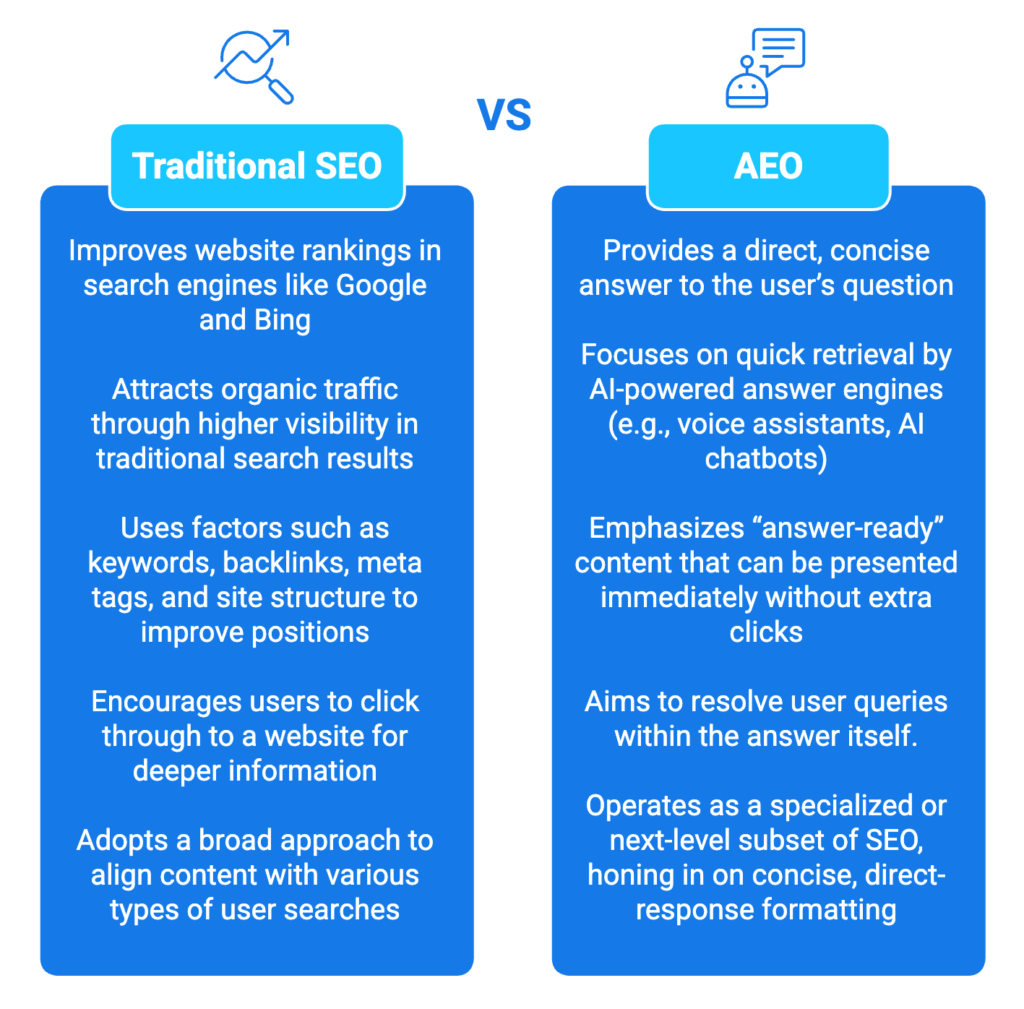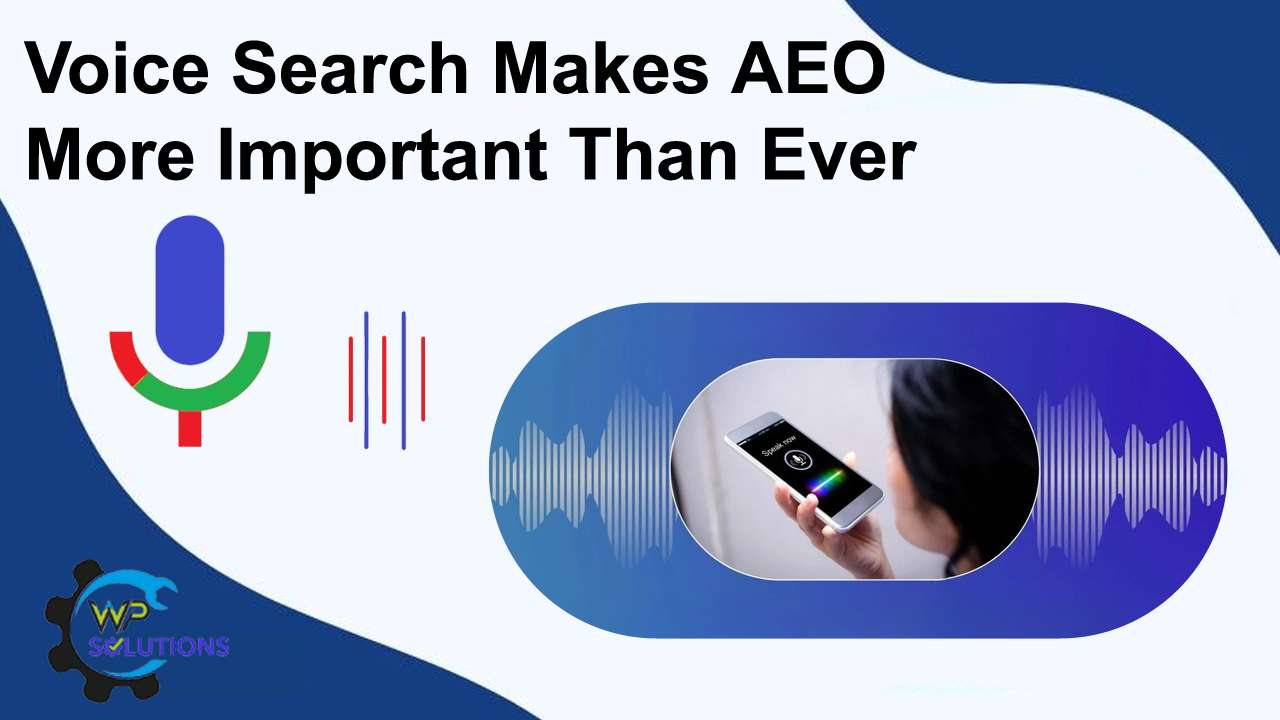Once upon a time, we typed to search. Now we speak. With voice assistants like Siri, Alexa, and Google Assistant entering our daily lives, the way people search for information has completely changed. And with this change comes a brand new frontier for digital marketers and SEO experts alike: Answer Engine Optimization or AEO.
AEO is not just some trendy acronym. It is the future facing cousin of traditional SEO. It focuses on helping websites provide clear, direct answers to spoken questions. And let is be honest when users speak they want answers now. Not tomorrow. Not hidden in paragraph 6. So if your content is not ready to answer clearly, you are missing out.
Voice Search Is not the Future, It is Already Here and Growing Fast
Voice search is not a futuristic dream; it is happening right now everywhere. People are talking to their phones in traffic, asking their smart speakers for dinner ideas or searching for nearby services while multitasking. The shift is massive and only growing stronger by the day.
Why? Because talking is easier than typing. It is faster, more natural, and hands-free. That is why millions of searches every day come from voice. And guess what? These searches are way more conversational, and that is where AEO shines.
Answer Engine Optimization Is Different From Traditional SEO

Traditional SEO is all about keywords, backlinks, and rankings. But AEO takes a different path. It is all about providing clear, structured answers that voice assistants can understand and deliver instantly.
Instead of fighting for Page 1, AEO aims for Position Zero, the featured snippet. That is the golden spot. When someone asks a question, and your answer is read aloud by Google? That is AEO magic in action.
People do not search the Same Way When They Speak
Typed searches are short weather Paris. But spoken ones? Different. Hey Google, what is the weather like in Paris this weekend? This shift in behavior means your content needs to be more natural, more conversational, and more direct.
You have got to think like a human, not a machine. Structure your answers in a way that feels like a real conversation. Use full sentences, simple phrases, and anticipate what people might say, not just what they might type.
Structured Data and Featured Snippets Are the Real MVPs
If your site is not using structured data, you are already behind. Structured data helps search engines understand what your content means, not just what it says. It is the secret sauce behind AEO.
Here is what makes structured data so powerful
- It helps Google pull the right answer at the right time.
- It makes your content eligible for featured snippets.
- It gives you more visibility in voice search results.
- It makes your site more attractive to smart assistants.
Local Businesses Need AEO More Than Anyone
Voice search is hyperlocal. People often ask their phones for things near them. Where is the best pizza place near me?Or whatt time does the pharmacy close? If you run a local business, you must optimize for voice search and AEO.
Make sure your business info is up to date on Google My Business. Add FAQs. Use natural language in your service pages. Help your site answer the real questions your customers are asking out loud.
FAQs and Conversational Content Are AEO's Secret Weapons
If you have not created a Frequently Asked Questions (FAQ) page, do it now. Better yet, sprinkle questions and answers throughout your site. Voice search loves content that sounds like a back-and-forth conversation.
A strong FAQ strategy includes
- Writing in a Q&A format
- Using real everyday language
- Covering both short and long-tail queries
- Providing clear, direct answers in under 30 words
The more you sound like a helpful human, the more likely it is that an assistant like Alexa or Siri will choose your content.
AEO Demands Speed, Simplicity, ty and Clarity
Voice assistants would not wait. Your content needs to be fast-loading, mobile-friendly, and instantly clear. If your page takes forever to load or buries the answer under fluff, it is game over.
Cut the jargon. Avoid b,ig complicated sentences. Get to the point fast. Remember, er AEO is not about showing off. It is about serving up the cleanest, slearest answers with zero friction.
The Bottom Line: AEO is not Optional Anymore. It ismission-criticall
Voice searchhas changedd thrulessl, and AEO is your ticket to staying in the game. It is not just nice to have it is a necessity if you want to stay visible, le competitive, and relevant in a world that is no longer typing.
So here is the real talk: if your website can not answer questions out l, oud it might as well be whispering into the void. The time for AEO is now. Not next year. Not when you finally get around to it Now.
Final Thought
Do not dismiss AEO as just another passing trend. It is not a tech fad, it is the next phase in the evolution of SEO. As voice search rapidly takes over, our users are no longer typing; they are talking. That means your content must be direct, fast, and genuinely helpful. Voice assistants like Alexa and Google would not wait around; nd they want clear answers now. If your site can not be delivered, it will not be heard. In this new era of search, AEO is not an option; it is survival. Be clear. Be fast. Be helpful. Or be left behind in the silence. The future of search is listening loud and clear.
FAQs
AEO stands for Answer Engine Optimization. It focuses on structuring your content to directly answer user questions especially those asked via voice search. Unlike traditional SEO AEO is about being the exact answer that voice assistants pull and read aloud.
Voice search is more conversational and question based. People do not talk like they type. This shift means websites need to create content that sounds natural answers questions quickly and uses long tail spoken style keywords.
Start by using clear natural language. Add FAQ sections target featured snippets and use structured data (schema markup). Make sure your content answers common questions directly preferably in under 30 words.
Absolutely! Voice search is often used for local queries like near me searches. Optimizing your Google Business Profile using local keywords and adding voice friendly FAQs can help your business get found fast.
Tools like Answer the Public Semrush Google is People Also Ask and Schema.org can guide your content. Use them to find real questions users are asking and structure your answers clearly for voice assistants.


lz0vda